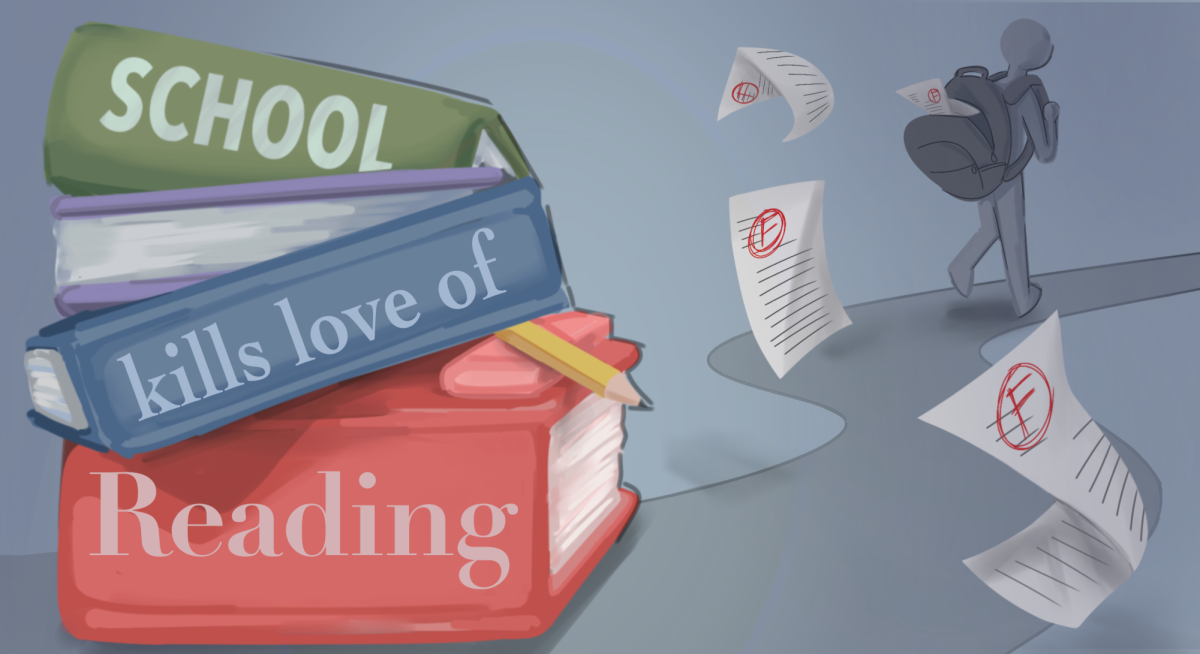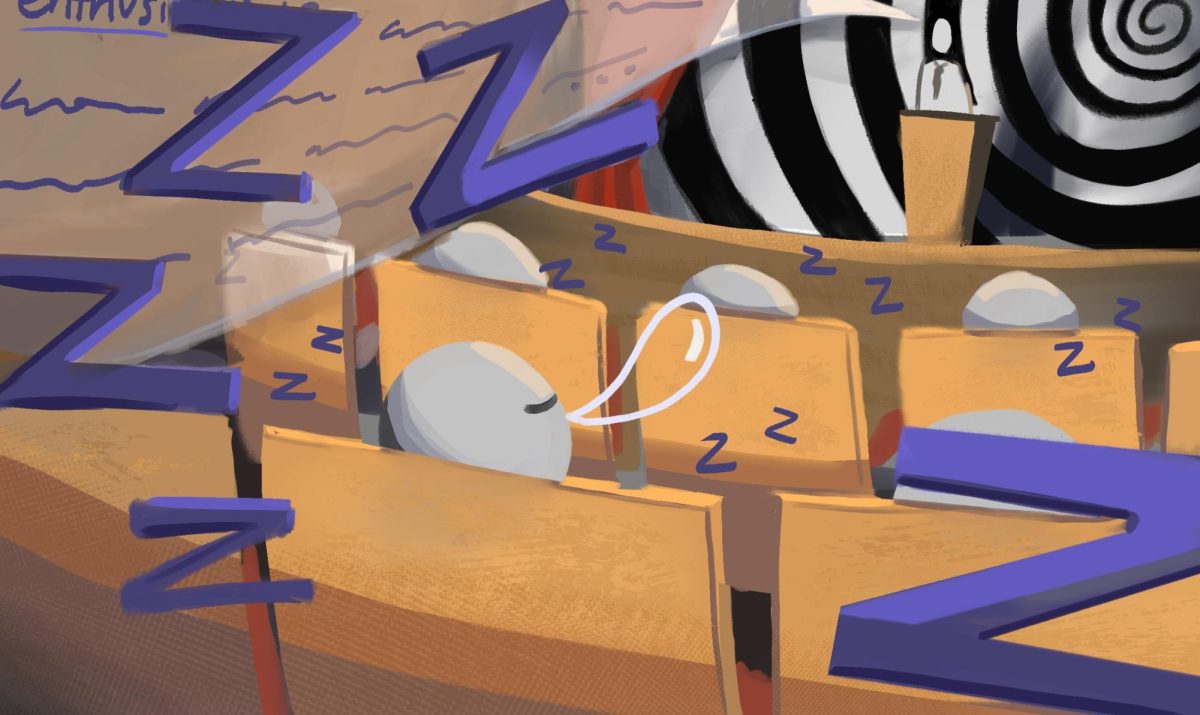I step into my room, glancing at the piles of books littering the floor. Most are assigned reading for English class. A few are books that I’ve selected for myself, untouched and collecting dust. I sit down and skim through my required reading. Eyes glazing over halfway through, I decide to take a procrastination break, pulling out my phone and scrolling through video after video to ease the boredom.
This routine is one that many high school students struggle with when it comes to pleasure reading, but it doesn’t seem to affect younger kids as strongly. The 2009 Programme for International Student Assessment concluded that attitudes toward leisure reading soured in students at higher grades. At my elementary school, reading came about as a result of pure interest. We freely explored our classroom bookshelves, eagerly thumbing through the pages of any book that piqued our interest. When assigned reading was introduced in higher grades, the lack of freedom and tedious, often dull books gave me less incentive to read. Burnout, higher exposure to instant gratification and a general unwillingness to complete assigned tasks resulted in a shift in my opinion of reading. No longer is reading a fun hobby; it has now been forever branded as work.
High school English classes are one of the sources of the problem. Assigned reading is generally hit-or-miss in terms of enjoyability. When I don’t enjoy the required reading, I usually don’t care about its deeper meaning. My (least) favorite example of this is Home Fire. Though the book was about a very resonant topic, I felt that the unnecessary romance took away from the more important conflicts of the novel. As a result, every chapter was a slog, and when asked to analyze it, I felt that I had nothing to say.
Forcing an essay out of a student who feels apathetic about a piece only results in resentment and an empty essay that repeats obvious truths. Though the student practices logical reasoning, they do so in a way that doesn’t enrich their understanding, or does so in a surface-level way. Rather, that student will go home with a negative attitude towards reading that might persist even beyond high school.
Though liking a book is subjective, genuine enjoyment of a book generally leads students to be more inclined towards discussing it and writing about it. My favorite successful assigned book is Frankenstein, which I read last year. I enjoyed it for its still-relevant themes (such as nature vs nurture) and gripping storytelling style. Most of my classmates also liked it. Everyone had much more to say about it, which made class discussions and brainstorming much more fruitful and helped me write my essay easily.
The bottom line is this: students need to like the books they read to nurture their love of reading and procure the best results learning-wise. Administrators who decide each class’ reading list should focus on choosing books that will be popular with students. Using student feedback in the form of end-of-the-year polls can increase student engagement and ensure students are reading the most interesting books. After a few years of trial and error and consulting English teachers, administrators should be able to compile a list of successful books that they can use.
It is our lack of freedom with reading material and the way we are taught to approach books as work obligations in high school that not only affects the quality of our work, but also how we view books in general. Reframing how we approach reading in school is the final step we can take to reviving childhood attitudes towards reading.
Even if certain books are not very fun to read, I find that treating them like a book I’d read for fun helps me. I can read them curled up on my bed and talk about funny characters with my friends. I can make minimal annotations, and when I write about them, I can pretend I’m just jotting down notes about certain themes that I find interesting. There are also always interesting aspects of books, so I try to focus on those if the rest of the book seems dry. Small changes that I make in my reading process help make the experience more fun and engaging, which encourages me to open up a new book on the weekends.
In the busy landscape of high school, students don’t need more pressure to read boring books that spoil their learning experience and just add to their workload. Instead, a more relaxed, enjoyment-centric attitude toward reading in classrooms will naturally lead to better essays and make it more likely that students will continue reading even after high school.




![LALC Vice President of External Affairs Raeanne Li (11) explains the International Phonetic Alphabet to attendees. "We decided to have more fun topics this year instead of just talking about the same things every year so our older members can also [enjoy],” Raeanne said.](https://harkeraquila.com/wp-content/uploads/2025/10/DSC_4627-1200x795.jpg)


















![“[Building nerf blasters] became this outlet of creativity for me that hasn't been matched by anything else. The process [of] making a build complete to your desire is such a painstakingly difficult process, but I've had to learn from [the skills needed from] soldering to proper painting. There's so many different options for everything, if you think about it, it exists. The best part is [that] if it doesn't exist, you can build it yourself," Ishaan Parate said.](https://harkeraquila.com/wp-content/uploads/2022/08/DSC_8149-900x604.jpg)




![“When I came into high school, I was ready to be a follower. But DECA was a game changer for me. It helped me overcome my fear of public speaking, and it's played such a major role in who I've become today. To be able to successfully lead a chapter of 150 students, an officer team and be one of the upperclassmen I once really admired is something I'm [really] proud of,” Anvitha Tummala ('21) said.](https://harkeraquila.com/wp-content/uploads/2021/07/Screen-Shot-2021-07-25-at-9.50.05-AM-900x594.png)







![“I think getting up in the morning and having a sense of purpose [is exciting]. I think without a certain amount of drive, life is kind of obsolete and mundane, and I think having that every single day is what makes each day unique and kind of makes life exciting,” Neymika Jain (12) said.](https://harkeraquila.com/wp-content/uploads/2017/06/Screen-Shot-2017-06-03-at-4.54.16-PM.png)








![“My slogan is ‘slow feet, don’t eat, and I’m hungry.’ You need to run fast to get where you are–you aren't going to get those championships if you aren't fast,” Angel Cervantes (12) said. “I want to do well in school on my tests and in track and win championships for my team. I live by that, [and] I can do that anywhere: in the classroom or on the field.”](https://harkeraquila.com/wp-content/uploads/2018/06/DSC5146-900x601.jpg)
![“[Volleyball has] taught me how to fall correctly, and another thing it taught is that you don’t have to be the best at something to be good at it. If you just hit the ball in a smart way, then it still scores points and you’re good at it. You could be a background player and still make a much bigger impact on the team than you would think,” Anya Gert (’20) said.](https://harkeraquila.com/wp-content/uploads/2020/06/AnnaGert_JinTuan_HoHPhotoEdited-600x900.jpeg)

![“I'm not nearly there yet, but [my confidence has] definitely been getting better since I was pretty shy and timid coming into Harker my freshman year. I know that there's a lot of people that are really confident in what they do, and I really admire them. Everyone's so driven and that has really pushed me to kind of try to find my own place in high school and be more confident,” Alyssa Huang (’20) said.](https://harkeraquila.com/wp-content/uploads/2020/06/AlyssaHuang_EmilyChen_HoHPhoto-900x749.jpeg)











